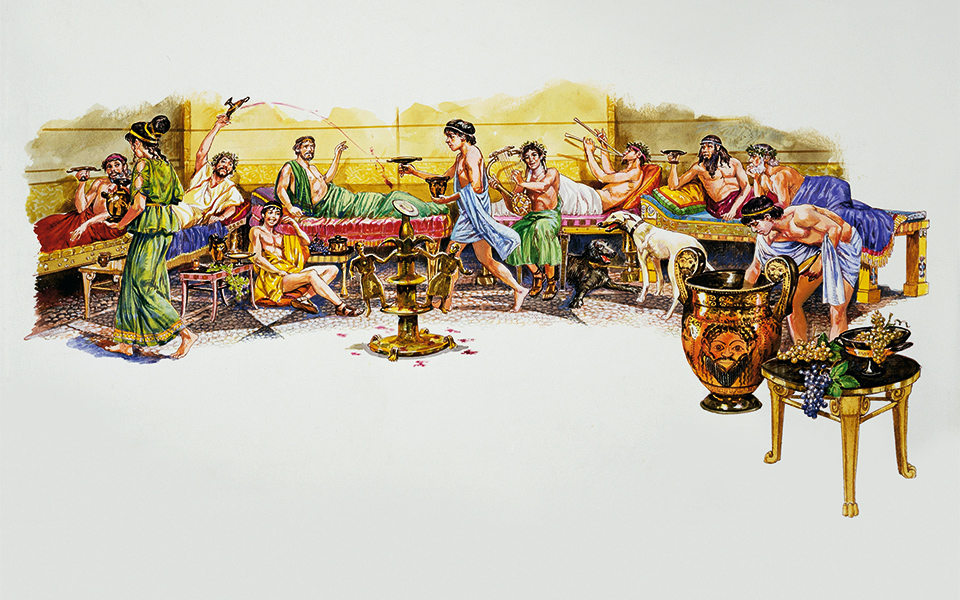Symposia, lavish evening banquets at which the wine flowed, are one of the best known social institutions of ancient Greece, thanks to literary descriptions, vase paintings and archaeological investigations of well-to-do residences equipped with a special party chamber: the andron (“men’s room”). Here, male guests reclined on couches, propped on their left elbows, enjoying food, drink, games and conversation, as well as music, dancing and often sex provided by hired female entertainers (hetairai). In a favorite game, exuberant diners flung their wine dregs at each other or at prepared targets. Symposia were ostensibly celebrations in honor of Dionysus, the god of wine. The guests at these social gatherings—which frequently culminated in free-spirited group sex, boisterous drunken discord, hurled cups or serving tables and bruising fist fights—were often depicted in visual art as lustful, wine-swilling satyrs, companions of Dionysus, who appeared as grossly-featured men bearing horses’ tails and ears…the prototypical “party-animals.”
The most popular wines at symposia came from Chalcidice, Ismaros, Chios, Cos, Lesbos, Mende, Naxos, Peparethos (Skopelos) and Thasos. “Bibline” wine may have been a Thasian imitation of Phoenician wine from Byblos. Symposium hosts did not serve their wine straight, according to Theophrastus (ca 371 – ca 287 BC), but usually cut or mixed it with various substances including perfume, honey, seawater, brine, oil, herbs, resin and spice. Hosts oversaw the mixing jar (krater) and decided how much wine their guests would drink. A favorite set of humorous guidelines (Eubulus, ca late 370s BC) suggested that the first three kraters were for Health, Love/Pleasure and Sleep, while additional servings led to Insolence, Shouting, Drunken Liberties, Black Eyes, Court Appearances, Irritability and ultimately Madness, Arms and Death.
One stock ancient joke claimed that the worst-behaved guests at symposia were the philosophers. Many times, symposia served as gatherings for disgruntled aristocrats, who drank wine and commiserated together, afterwards riotously taking to the streets to crash other parties or to show their drunken defiance of an increasingly democratic and distasteful authority.
Ever the sober scientist, Aristotle (384–322 BC) had “an abiding interest in wine’s pernicious effects.” In his now-lost treatise On Drunkenness, he offered formalized observations on how drinkers fall when under the influence of certain intoxicants: people drunk on barley wine fall only on their backs and lie face up; people affected by all other drinks fall in all directions – to the left, the right, on their faces or on their backs.
“Here, male guests reclined on couches, propped on their left elbows, enjoying food, drink, games and conversation, as well as music, dancing and often sex provided by hired female entertainers (hetairai). ”












